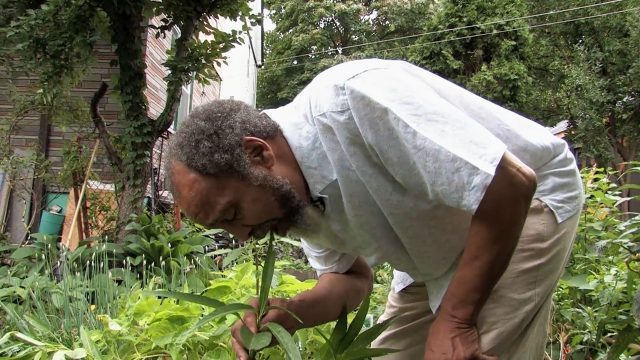
Milford Graves enjoys a bite in his garden in new documentary about the unique percussionist and philosopher
MILFORD GRAVES FULL MANTIS (Jake Meginsky, 2018)
Metrograph
7 Ludlow St. between Canal & Hester Sts.
Opens Friday, July 13
212-660-0312
metrograph.com
www.fullmantis.com
 Jake Meginsky’s unconventional documentary of unconventional musician Milford Graves begins with the following epigraph from Graves: “Look at the room downstairs / Look at the garden outside / Don’t try to analyze it / Just take it in.” That is not only Graves’s life philosophy but also the best way to experience Milford Graves Full Mantis, which opens today at Metrograph. Born in 1941 in South Jamaica, Queens, where he still resides, Graves is an avant-garde free jazz percussionist who plays and lives to his own beat. In 2004, Meginsky knocked on Graves’s door, asked to study with him, and soon became the Professor’s assistant. He’s been documenting him ever since; the film, codirected by drummer Neil Young, who also edited and photographed it with Meginsky, features compelling live footage along with peaceful moments in Graves’s basement and expansive garden. Early on, Meginsky shows a wild excerpt from a 1973 concert at the Jazz Middelheim Festival in Antwerp in which Graves performs with Joe Rigby and Hugh Glover on reeds and Arthur Williams on trumpet; the fierce, dissonant music might not be to everyone’s taste, but it serves as a terrific counterpoint to Graves’s calmer side, pontificating on, well, sometimes it’s hard to tell what, but it’s always fascinating.
Jake Meginsky’s unconventional documentary of unconventional musician Milford Graves begins with the following epigraph from Graves: “Look at the room downstairs / Look at the garden outside / Don’t try to analyze it / Just take it in.” That is not only Graves’s life philosophy but also the best way to experience Milford Graves Full Mantis, which opens today at Metrograph. Born in 1941 in South Jamaica, Queens, where he still resides, Graves is an avant-garde free jazz percussionist who plays and lives to his own beat. In 2004, Meginsky knocked on Graves’s door, asked to study with him, and soon became the Professor’s assistant. He’s been documenting him ever since; the film, codirected by drummer Neil Young, who also edited and photographed it with Meginsky, features compelling live footage along with peaceful moments in Graves’s basement and expansive garden. Early on, Meginsky shows a wild excerpt from a 1973 concert at the Jazz Middelheim Festival in Antwerp in which Graves performs with Joe Rigby and Hugh Glover on reeds and Arthur Williams on trumpet; the fierce, dissonant music might not be to everyone’s taste, but it serves as a terrific counterpoint to Graves’s calmer side, pontificating on, well, sometimes it’s hard to tell what, but it’s always fascinating.
There are also clips of Graves playing solo at the Brandeis Improv Festival in 2015 and in one of the Park Avenue Armory’s historic rooms in 2016; in 2011 in his basement, where he’s surrounded by African sculpture, books, and computers that record his heartbeat and nervous system, which he incorporates into his work; and in Japan in 1981 with dancer Min Tanaka at a school for autistic children, where his unique performance inspired the kids to get up and move to the groove. In his backyard dojo he explains Yara, the discipline he invented based on martial arts, African ritual dance, the Lindy Hop, and the praying mantis and which he refers to as “the black way of self protection.” There are no talking-head experts or Graves acolytes singing his praises; the only voice heard in the film is Graves’s own, and for the first half of its ninety minutes Meginsky doesn’t show the film’s subject as he talks. Instead, while Graves speaks about his past and shares his kaleidoscopic philosophies, the camera slowly focuses on his lush garden or shows some of Graves’s animations. But eventually Graves is seen sitting in his basement, telling a long, remarkable story of a turning point in his life. He’s an engaging character, bursting with enthusiasm and a unique view of the human body, the five senses, tear ducts, and the parasympathetic nervous system. And throughout, he keeps playing those drums, holding the sticks in his trademark way on a nonstandard kit he put together himself. Graves will be at Metrograph for Q&As with Meginsky, Young, and drummer William Hooker at the 7:00 screening on July 13 and with Meginsky at the 6:00 show on July 14; Meginsky will also participate in a Q&A following the 7:00 screening on July 19, which will be introduced by drummer Susie Ibarra.